The New Service Economy - KK-stiftelsen
The New Service Economy - KK-stiftelsen
The New Service Economy - KK-stiftelsen
You also want an ePaper? Increase the reach of your titles
YUMPU automatically turns print PDFs into web optimized ePapers that Google loves.
<strong>The</strong> <strong>New</strong> <strong>Service</strong> <strong>Economy</strong><br />
nowned scholars from around the globe, and conference presentations are<br />
generally used to verify research themes and ideas and to get feedback on<br />
both theories being applied and methods of analysis being used. Also, the<br />
research profile appears to have provided CTF researchers with opportunities<br />
to advance their quantitative analysis skills. <strong>The</strong> “Nordic School” of<br />
<strong>Service</strong>s Marketing and Management, of which CTF is considered to be a<br />
part, has historically been known for qualitative methods. Although such<br />
methods are still being employed, it is clear that a plethora of quantitative<br />
data have been collected and analyzed in the research publications resulting<br />
from the Knowledge Foundation funded projects. Being able to apply both<br />
qualitative and quantitative methods clearly has allowed CTF to expand its<br />
capabilities.<br />
In looking to the future, if CTF is to become “world-class” in terms of its<br />
research, we suggest that more of the research emanating from its projects<br />
needs to make major theoretical contributions (breakthroughs) to the service<br />
marketing and management discipline. <strong>The</strong> research (and thus the subsequent<br />
publications) from the Knowledge Foundation funded projects has<br />
followed a very project-oriented strategy. En nära relaterad fråga är insikten<br />
att kunskap om hur en bra tjänst kan utvecklas inte alltid sammanfaller med<br />
kunskap om hur metoden kan implementeras. That is, projects appear to<br />
have been undertaken in large part whenever sufficient funding is available,<br />
regardless of the potential of the research to make significant contributions<br />
to the literature. What seems to be missing, and in our opinion is needed, is<br />
an overall vision for CTF as to the type and nature of research projects to<br />
undertake. One consequence of a strong vision (one that is clearly defined<br />
and declared) would be to provide direction and guidance in identifying<br />
appropriate research projects; projects then should be selected not only because<br />
they have the potential to generate funding for CTF but also when<br />
they would provide a platform for research that can make major contributions<br />
to the literature and be published in high quality publications. While<br />
we do not feel it our place to determine the specifics of such a vision for<br />
CTF, based upon the discussions we see service science and service innovation<br />
as two potential unifying themes.<br />
2. Research environment<br />
<strong>The</strong> research environment has been, and still is, well managed and organised.<br />
Such organization has undoubtedly had an obvious impact on the recognition<br />
of the research profile in the academic context, as well as within<br />
the industry and the public sector in Scandinavia. <strong>The</strong> internal organisation<br />
of work and administrative support live up to high standards. <strong>The</strong> mixture<br />
between senior researchers, post-doc scholars, and doctoral students seems<br />
to be fruitful and balanced, and the daily procedures for tutoring, seminars,<br />
and other internal meetings are well designed and reflect good academic<br />
62


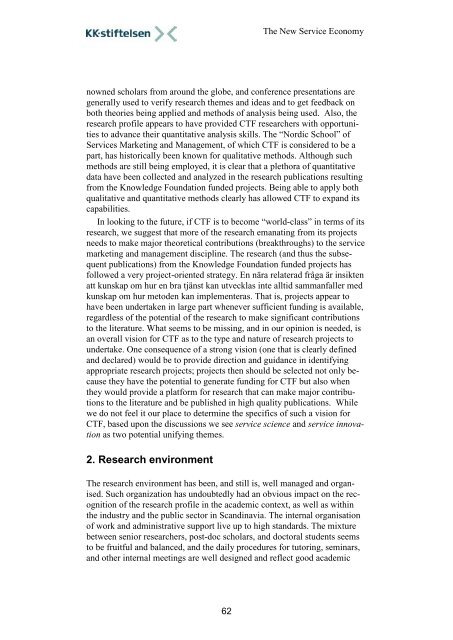
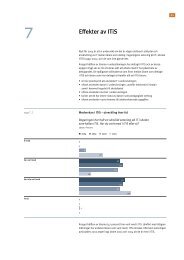
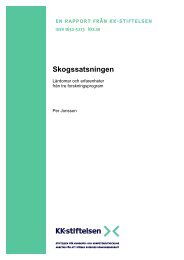
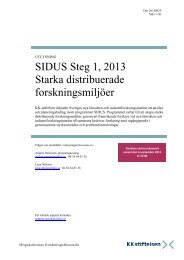
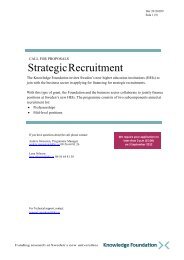
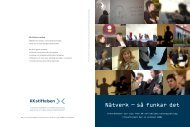
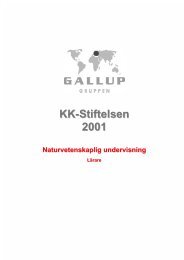
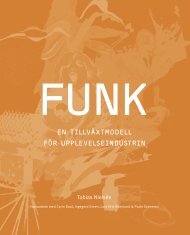
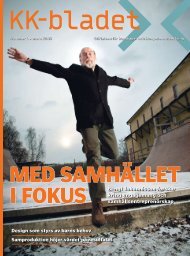

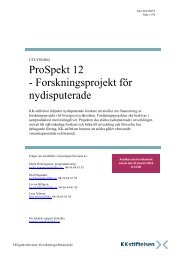
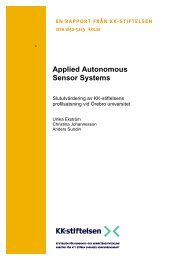

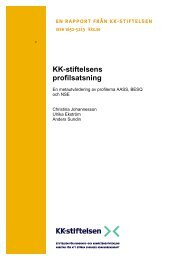
![[Klicka här och skriv titel] - KK-stiftelsen](https://img.yumpu.com/23861299/1/184x260/klicka-har-och-skriv-titel-kk-stiftelsen.jpg?quality=85)